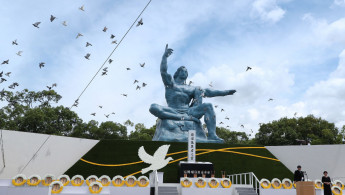US, UK boycott Japan nuclear bomb memorial after Israel snubbed
Ambassadors from Western countries - including the US and UK - will skip a ceremony marking the 79th anniversary of the nuclear bombing of Nagasaki after Israel was snubbed, officials said Wednesday.
Nagasaki's mayor said last week that Israel's ambassador Gilad Cohen was not invited to Friday's event in the southern Japanese city because of the risk of possible protests over the Gaza conflict.
The US and UK embassies said on Wednesday their ambassadors would not take part as a result and that their countries would be represented by lower-ranking diplomats.
Media reports said Australia, Italy, Canada, and the EU, who together with the US, UK, and Germany signed a strongly worded joint letter to Nagasaki's mayor last month, would follow suit.
US ambassador Rahm Emanuel will not attend "after the mayor of Nagasaki politicised the event by not inviting the Israeli ambassador", an embassy spokesperson told AFP.
Instead, Emanuel, 64, who was ex-president Barack Obama's chief of staff, will go to a separate event at a temple in Tokyo, the spokesperson said.
Emanuel is fiercely pro-Israel, with his father being a former member of the Irgun, a Jewish paramilitary group that targeted British soldiers and Palestinian civilians in mandatory Palestine.
The British embassy said Ambassador Julia Longbottom would also not be in Nagasaki, adding that not inviting Israel "creates an unfortunate and misleading equivalency with Russia and Belarus - the only other countries not invited to this year's ceremony".
A spokesperson for the French embassy said its number two would attend, telling AFP that the "decision not to invite the representative of Israel is regrettable and questionable".
The European Union's ambassador would not take part "due to his agenda" and the bloc would be represented by a lower-level diplomat, a spokesperson told AFP.
The German embassy told AFP that the head of its political division would attend, with the decision made "in light of the absences and availability" of senior embassy staff.
'Wrong message'
Nagasaki mayor Shiro Suzuki said last week the decision not to invite Cohen was "not politically motivated" but based on a desire to "hold the ceremony in a peaceful and sombre atmosphere".
Suzuki said in June Nagasaki had sent a letter to the Israeli embassy calling for an "immediate ceasefire" in Gaza.
Cohen, who was invited to and attended a memorial ceremony in Hiroshima on Tuesday, said last week the Nagasaki decision "sends a wrong message to the world".
"As a close friend and like-minded nation of Japan, Israel has attended this ceremony for many years to honor the victims and their families," he wrote on social media platform X.
Cohen told US broadcaster CNN on Monday that the security concerns were "invented" and that he was "really surprised by (Suzuki) hijacking this ceremony for his political motivations".
In their letter to Suzuki seen by AFP, the six Western envoys had warned "it would become difficult for us to have high-level participation at this event" if Israel was excluded.
Government spokesman Yoshimasa Hayashi declined to comment on Wednesday, saying invitations were "a decision for the organiser, Nagasaki City".
A Nagasaki official in charge of the ceremony said it was "obviously better to have high-level individuals, like ambassadors themselves, taking part".
"What is important is that representatives of the countries will attend the ceremony," he told AFP.




 Follow the Middle East's top stories in English at The New Arab on Google News
Follow the Middle East's top stories in English at The New Arab on Google News


![A group of Palestinians, foreign and Israeli activists gather to participated in an olive picking event on the land in the town of Battir, which is under threat of confiscation by Israel in Bethlehem, occupied West Bank on 8 November 2024. [Getty]](/sites/default/files/styles/image_330x185/public/2182930803.jpeg?h=199d8c1f&itok=__0LgGsa)